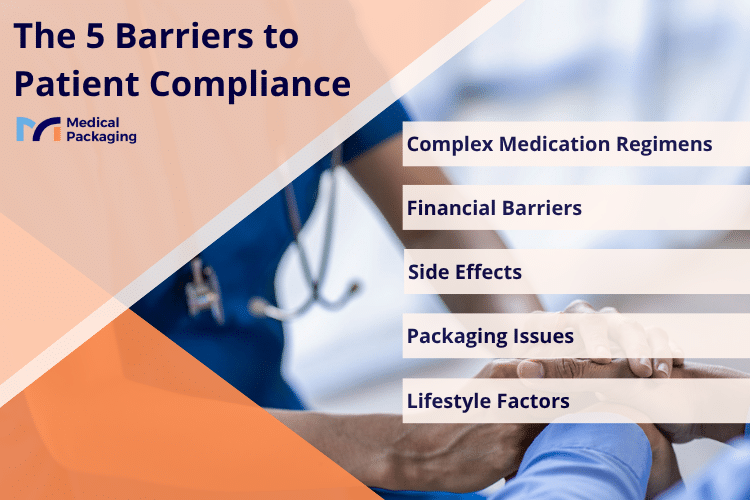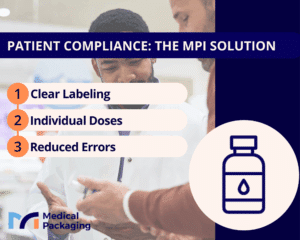Patient Compliance Challenges: Key Aspects for Healthcare Organization

Holding hands, doctor and patient with comfort, compassion and advice with results in clinic. Closeup, help and medical with sympathy, consultation or review for diagnosis, healthcare and empathy
Patient compliance refers to how consistently patients follow prescribed medication and treatment plans as directed by their healthcare providers. Patient adherence to medication regimens and treatment instructions plays a key role in achieving positive health outcomes and reducing healthcare costs.
Healthcare professionals continuously work to address patient compliance challenges, as many in the United States face difficulties following their prescribed treatment plans correctly. This widespread concern affects clinical outcomes across medical specialties, from managing chronic disease to completing short-term antibiotic courses. When patient noncompliance occurs through missed doses, incorrect amounts, or early treatment cessation, their health can decline, potentially leading to adverse events, hospital readmissions, and increased healthcare expenditures.
The healthcare industry has identified several common obstacles affecting medication compliance, including complex medication regimen requirements, unclear instructions, and difficulty tracking doses. Advanced unit dose packaging design and clear labeling have proven instrumental in keeping patients on track with their prescribed medication. These practical solutions, combined with patient education and support systems, help healthcare provider teams guide patients toward completing their prescribed treatment successfully.

Understanding Patient Compliance Barriers
Patient compliance remains a significant challenge in healthcare, with research showing that 50% of patients don’t take their prescribed medication as directed. Several distinct barriers contribute to this widespread issue of poor compliance.
Complex Medication Regimens
Complex medication regimen requirements create a major hurdle for many patients. When individuals with chronic conditions must take multiple medications at different times throughout the day, the likelihood of missed doses increases substantially. Patients managing chronic illness often struggle to coordinate various prescriptions, especially when timing requirements conflict or interact with meals.
Financial Barriers
Cost presents another significant obstacle to medication compliance. Many patients face difficult choices when prescription expenses strain their budgets. Some respond by splitting pills, skipping doses, or delaying refills—practices that can seriously impact their health outcomes. Insurance gaps and high deductibles further compound these financial pressures.
Side Effects and Adverse Reactions
Side effects significantly influence patient adherence to their medication schedules. Physical discomfort, drowsiness, or other adverse events may lead people to reduce doses or stop taking prescribed medication entirely without consulting their healthcare provider.
Packaging and Accessibility Issues
Packaging-related issues create unexpected barriers for elderly patients. Arthritis sufferers often find child-resistant containers impossible to open. Small text on labels makes instructions difficult to read for those with vision problems. Multiple look-alike containers increase the risk of mixing up medications or taking incorrect doses.
Behavioral and Lifestyle Factors
Behavioral and lifestyle changes play a crucial role in compliance. Some patients lack motivation to follow their treatment plan when they do not experience immediate symptoms. Others struggle to incorporate medicine routines into irregular work schedules or travel. Memory challenges, particularly among elderly patients, lead to unintentional missed doses despite good intentions to follow prescribed treatment.
Understanding these interconnected barriers helps health professionals develop targeted solutions that support patients successfully following their prescribed medication.

Woman pharmacist consulting customer at counter for prescription drugs or medicine at the pharmacy. Female doctor giving patient medical antibiotics at the pharmacy
Advanced Unit Dose Packaging Solutions for Enhanced Patient Compliance
Modern pharmaceutical packaging has evolved significantly to address compliance challenges and support patient adherence across healthcare settings. Advanced automation and innovative unit dose design now offer healthcare professionals multiple options to support proper medication compliance while reducing adverse events risks.
Precision Unit Dose Systems
Unit dose packaging systems accommodate prescribed medication in clearly marked, individual compartments. These systems use heat-sealed materials that maintain medication integrity while providing clear identification. Each package includes essential details like medication names, dosage, lot numbers, and expiration dates, making it easier for health professionals to verify medications before administration and reducing the risk of medication errors.
Liquid Medication Packaging Solutions
Specialized equipment handles precise measurement and packaging of liquid medications in unit dose formats. Modern systems incorporate features like light-protective materials and tamper-evident seals. Pre-filled syringes and unit dose cups come with integrated measurement markings and clear labeling to support accurate medication compliance and reduce waste.
Smart Labeling and Tracking Technologies
Advanced labeling solutions incorporate barcoding capabilities that integrate efficiently with electronic health records. Each package includes machine-readable codes containing medication regimen data, administration instructions, and tracking information. This technology enables healthcare professionals to scan medications at the point of care, confirming the right patient receives the right prescribed medication at the right time.
Healthcare Setting Applications
Hospitals utilize automated unit dose packaging systems for their high-volume medication dispensing needs. The equipment interfaces with pharmacy management software for streamlined workflow and enhanced medication safety protocols.
Long-term Care Facilities benefit from multi-dose packaging that organizes medications by administration time. This format helps staff manage complex treatment plans for multiple elderly patients while reducing medication administration errors.
Specialty Pharmacies employ custom unit dose packaging solutions for unique medication forms and combinations. Their systems accommodate special handling requirements while maintaining compliance standards and ensuring medication stability.
Contract Manufacturers rely on high-capacity equipment designed for consistent, quality-controlled packaging of large medication batches. These solutions incorporate multiple inspection points to maintain accuracy and meet regulatory requirements.
Building Effective Patient Compliance Support Systems
Healthcare organizations can significantly improve patient compliance by implementing structured support systems that work in harmony with their existing operations. Strong support frameworks combine healthcare professionals’ preparedness, smooth operational processes, and consistent medication compliance monitoring.
Staff Training Excellence
Medical staff need targeted training to maximize the effectiveness of unit dose packaging systems. Key training components include:
- Hands-on practice with packaging equipment, documentation procedures, and verification protocols
- Patient education methods that help explain dosing schedules and prescribed medication use
- Compliance tracking techniques, including using digital monitoring tools and maintaining accurate patient outcomes records
- Understanding of common compliance barriers and how to address them with patients
Streamlined Integration Approaches
Successful support systems fit naturally into daily workflows. Organizations should focus on:
- Mapping out medication dispensing processes and identifying opportunities to reduce steps without compromising treatment plan accuracy
- Making quality checks routine parts of the workflow, with clear documentation requirements and verification points
- Building safety measures directly into standard procedures, such as double-checking patient information and medication details
- Ensuring seamless integration with existing pharmacy management and electronic health record systems
Monitoring and Follow-Through
Regular follow-up appointments form the backbone of compliance tracking. Effective monitoring strategies include:
- Scheduling structured follow-up calls or visits to review patient adherence and address any side effects or challenges
- Tracking both quantitative metrics like adherence rates and qualitative feedback about patient outcomes
- Analyzing compliance data monthly to spot trends and adjust support approaches accordingly
- Implementing early intervention protocols when compliance issues are identified
The most successful patient support systems create a consistent experience from prescription to final dose. By focusing on health professionals’ capabilities, practical processes, and active monitoring, healthcare organizations can build sustainable frameworks that promote better health outcomes.

The Future of Medication Compliance
Patient compliance and medication compliance challenges persist across the healthcare industry, from missed doses to incorrect administration protocols. Healthcare professionals can achieve significant improvement in patient adherence rates and health outcomes through the strategic implementation of advanced unit dose packaging technology, comprehensive staff training programs, and data-driven monitoring systems.
Effective compliance programs demand a comprehensive approach that integrates:
- Clear prescribed medication instructions and dosing schedules
- Streamlined unit dose packaging designs that reduce confusion
- Sophisticated automated tracking systems for real-time monitoring
- Regular follow-up appointments and patient education initiatives
- Integration with electronic health records and pharmacy management systems
As healthcare delivery continues to evolve, packaging solutions featuring built-in compliance capabilities will become increasingly critical for supporting both patients and healthcare professionals. Advanced unit dose packaging incorporating visual dose indicators, electronic monitoring capabilities, and intuitive user-friendly designs effectively eliminates common barriers to proper treatment plan adherence.
MPI stands as a leading global manufacturer specializing in innovative unit dose pharmaceutical packaging and labeling systems.
Don’t let poor patient compliance continue to impact your health outcomes and operational efficiency. Partner with Medical Packaging Inc., LLC today to explore how our comprehensive unit dose packaging solutions can significantly strengthen your medication compliance program and deliver measurable improvements in patient outcomes.
Contact MPI Today for Personal Assistance
MPI’s Drug Master File provides speed-to-market regulatory and technical support related to our packaging components for medical and pharmaceutical market clients